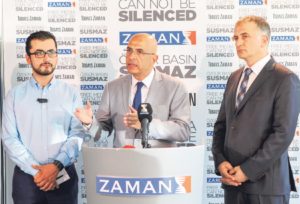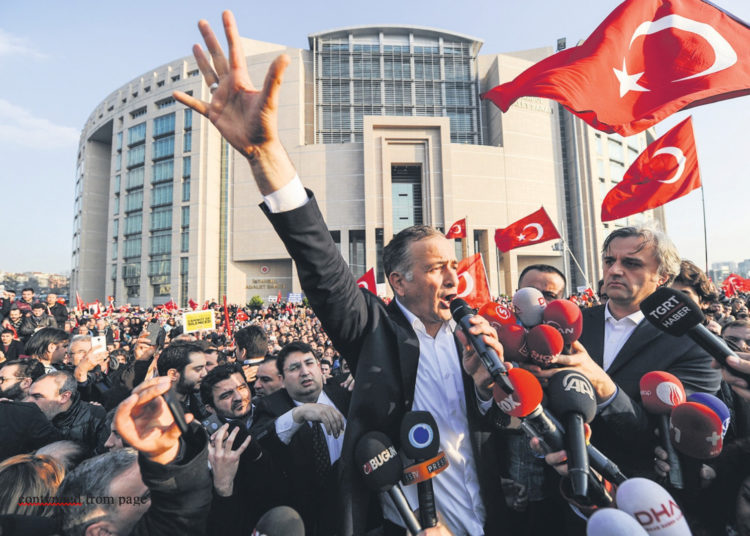Abdullah Bozkurt / Stockholm
A US-based Turkish journalist, the one-time editor-in-chief of Turkey’s largest national daily, faces 30 arrest warrants issued by the government of President Recep Tayyip Erdoğan, who has turned his country into the largest prison for journalists in the world.
Ekrem Dumanlı, the former editor-in-chief of the Zaman daily, has been slapped with multiple criminal charges, mostly defamation of the president, leveled by the Erdoğan government as part of a campaign of intimidation targeting critical journalists at home and abroad.
Under orders from the government, partisan judges have issued a total of 30 outstanding arrest warrants for him, making Dumanlı perhaps the most wanted critical journalist in Turkey. The accusations range from defaming and insulting President Erdoğan and members of the judiciary to terrorism and coup plotting, the usual charges the Turkish government files against independent and critical journalists in Turkey and those living in exile abroad.
According to official documents dated July 12, 2021 obtained by Nordic Monitor, Turkish prosecutors are seeking the arrest of Dumanlı, a resident of the US, for defamation and terrorism, the two most abused criminal charges used by the Erdoğan government to stifle dissent, suppress opposition voices and crack down on freedom of expression.
Violations of freedom of the press and expression gained momentum in Turkey following the Dec. 17 and 25, 2013 corruption probes, which exposed the country’s most serious corruption scheme to date that included Erdoğan and senior government officials. The government shut down Twitter and YouTube in the wake of the investigations, which were glossed over, with government interference in the police force and the judiciary.
30 arrest warrants filed for journalist Ekrem Dumanlı, who now lives in exile in the United States:
Media outlets critical of the government were targeted in police operations, with 16 journalists, including Samanyolu Broadcasting Group Manager Hidayet Karaca and Dumanlı, arrested for their journalistic activities. The detentions prompted condemnation from international press advocacy groups, while the European Union and the United States expressed concern over the crackdown.
Dumanlı moved to the United States after he was detained for three days on December 14, 2014 on charges that his newspaper slandered Turkish al-Qaeda group Tahşiyeciler, whose radical leader, Mullah Mohammed (aka Mehmet Doğan), called for an armed jihad and the beheading of Americans and expressed support for Osama bin Laden.
The operation targeting the Tahşiyeciler group took place on Jan. 22, 2010. Police raided the homes and offices of 112 people across Turkey and discovered three hand grenades, one smoke bomb, seven handguns, 18 hunting rifles, electronic parts for explosives, knives and a large cache of ammunition. Zaman and other national media covered the crackdown and reported on the case against the group.
In 2014 President Erdoğan, then prime minister, had a change of heart about the group and started defending Tahşiyeciler and Mullah Mohammed and claimed the radical preacher was innocent. Erdoğan publicly targeted Zaman at rallies, asked people to not buy the paper and pressured companies to halt their advertising. The government campaign against the daily had the opposite effect, with Zaman increasing its subscription numbers to record levels.
Zaman, which used to sell 1.2 million copies a day at its peak, was seized by the government in March 2016 as the government wanted to silence the mainstream daily, which was exposing corruption in the Erdoğan government and revealing clandestine intelligence operations that aided and abetted armed jihadist groups.

After the government takeover, the paper was turned into a government mouthpiece overnight, with its editors fired and government loyalists brought in to run the publication. Circulation dropped to 4,000 in a week after a major reader backlash, and the government shut it down in July 2016, wiping out decades of work in the newspaper’s archives and taking down its website.
Though living in exile in the US, hunted and harassed by operatives of the Erdoğan regime, Dumanlı has been trying to continue his journalistic work under challenging circumstances.
Launching criminal charges against journalists in exile is part of an intimidation campaign pursued by the Turkish government to prevent them from speaking out and against President Erdoğan. The government also went after their family members, immediate and distant, initiating investigations in a blatant abuse of the criminal justice system in Turkey, where the rule of law has effectively been suspended.
The Erdoğan government brands all its critics as terrorists, and 174 journalists are currently locked up in Turkish jails on terrorism charges, making Turkey one of the world’s leading jailers of journalists, according to the latest monitoring report by the Stockholm Center for Freedom. Like Dumanlı, 167 Turkish journalists in total have been forced into self-exile to escape prison on false accusations.
Nearly two-thirds of the arrest warrants issued for Dumanlı originated from defamation charges filed by Erdoğan’s lawyers.
The Stockholm Center for Freedom reported in March 2021 that Turkish prosecutors investigated 128,872 people for insulting Erdoğan between 2014 and 2019, resulting in prison sentences for nearly 10,000 people with many cases still pending. The crackdown targeted 318 minors between the ages 12 and 17 who have been the subject of criminal investigations for insulting the head of state.
Article 299 of the Turkish Penal Code (TCK) states that any person who insults the president of the republic faces a prison term of up to four years. This sentence can be increased by a sixth if it has national exposure, and by a third if committed by the press or media. In total 9,554 people have been handed down sentences for insulting the president.

Unlike Erdoğan, former presidents rarely used allegations of slander in criminal complaints against critics and opponents. The Turkish president has brought legal action on insult charges against 38,581 people during his time in office as president, compared to a total of 1,716 insult cases launched by five presidents before him, according to a recent report by an opposition lawmaker in Turkey. The huge spike in defamation cases under Erdoğan’s tenure drew the attention of European inter-governmental organizations as well.
Dumanlı faces four arrest warrants on terrorism allegations, charges often used by the Erdoğan government to hunt down critics and opponents. According to statistics released by the Council of Europe (CoE), as of January 2020 out of 30,524 prisoners convicted on terrorism charges in the 47 CoE member states, 29,827 were in Turkey. In other words, 98 percent of all inmates convicted of terrorism in all of Europe are resident in Turkey. It shows how the government abuses its counterterrorism laws to punish critics, opponents and dissidents in this country of 84 million that is suffering under the iron grip of President Erdoğan.
Not only journalists but also more than 30 percent of all Turkish diplomats, 60 percent of all senior police chiefs, half of all flag officers and some 30 percent of all judges and prosecutors in Turkey were also declared terrorists overnight in 2016 by the executive decisions of the Erdoğan government without any effective administrative investigations and certainly without any judicial proceedings.

Critics of the Erdoğan government, especially members of the Gülen movement, have been facing surveillance, harassment, threats of death and abduction since 2014, when Erdoğan decided to scapegoat the group for his own legal troubles, ranging from corruption to aiding and abetting jihadist groups in Syria. The movement, led by Turkish Muslim cleric Fethullah Gülen, who resides in the US, has been an outspoken critic of the Erdoğan government on a range of issues.
In Turkey more than half a million people affiliated with the Gülen movement have faced punitive legal action on fabricated terrorism charges in the aftermath of a coup attempt in July 2016. Since then, in excess of 130,000 civil servants have been fired by the government with no effective judicial or administrative investigation, 4,560 of whom were judges and prosecutors and were replaced by pro-Erdoğan staff. As a result of the massive purge, the Turkish judiciary and law enforcement authorities have become tools in the hands of the Islamist government of President Erdoğan.
The assets of individuals and entities affiliated with the movement which, according to estimates from Turkey’s Savings Deposit Insurance Fund (TMSF), amounted to $11 billion, were also expropriated. The government also seized the assets and wealth of critical journalists and deprived them of their livelihood in order to stifle freedom of press and expression.












